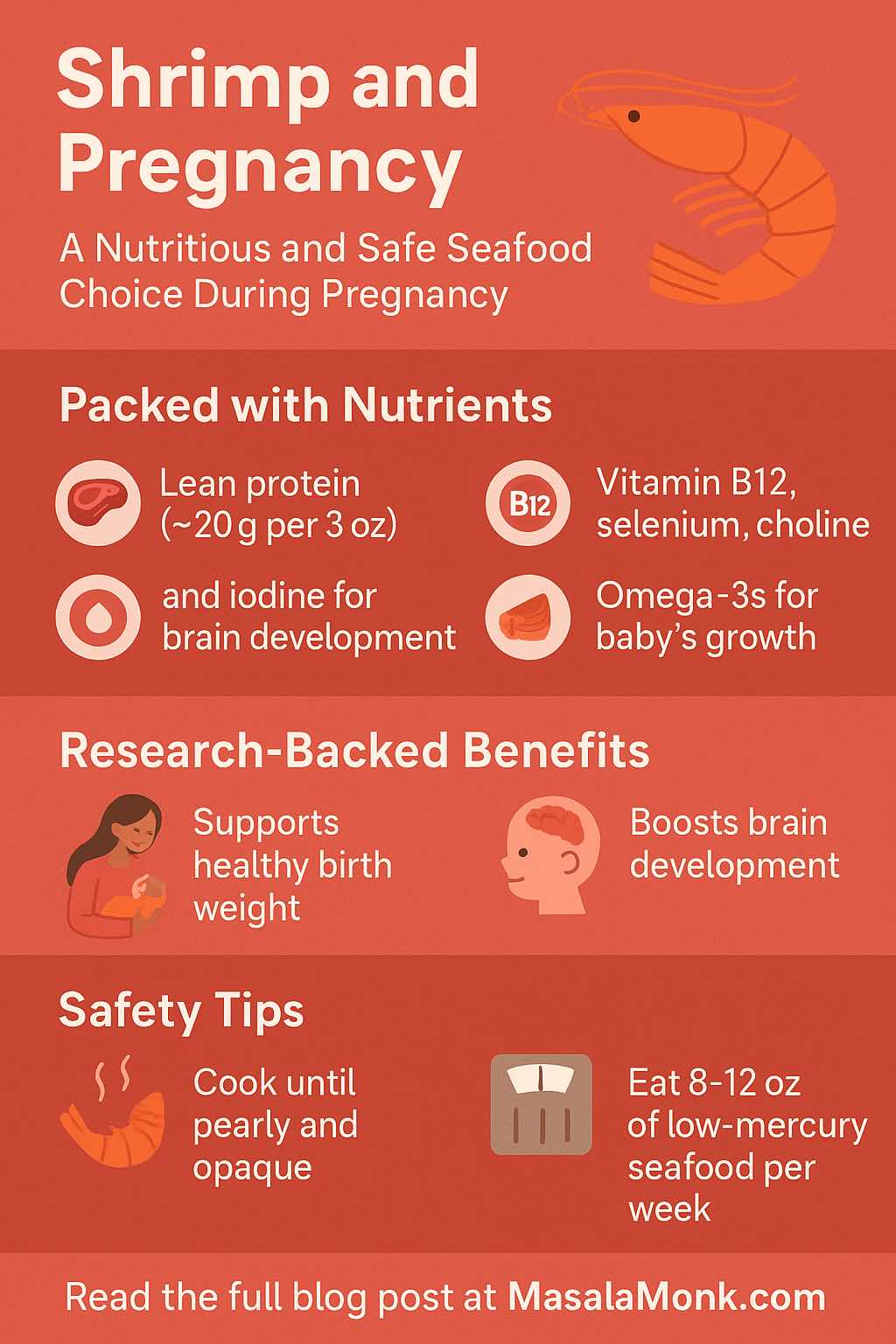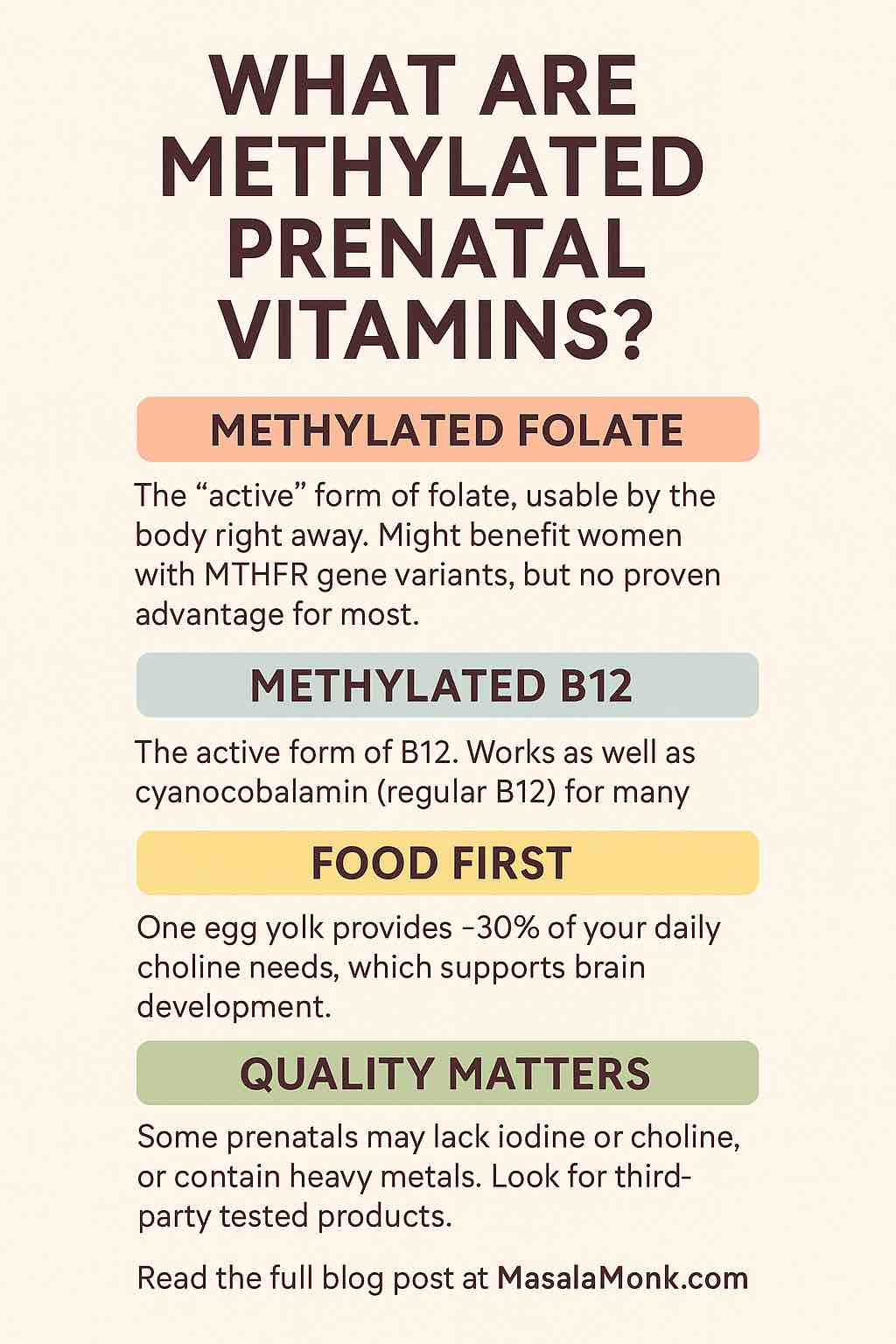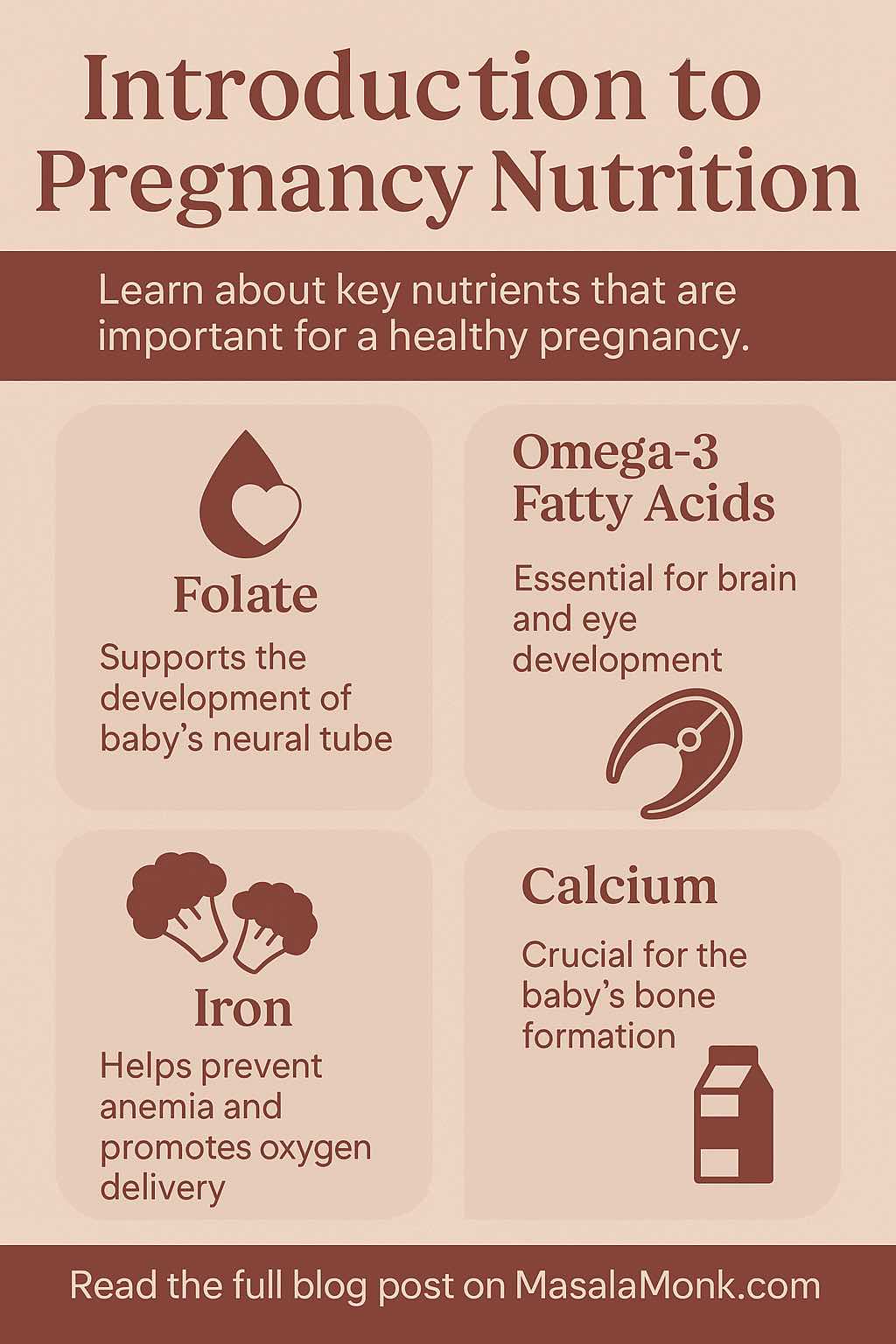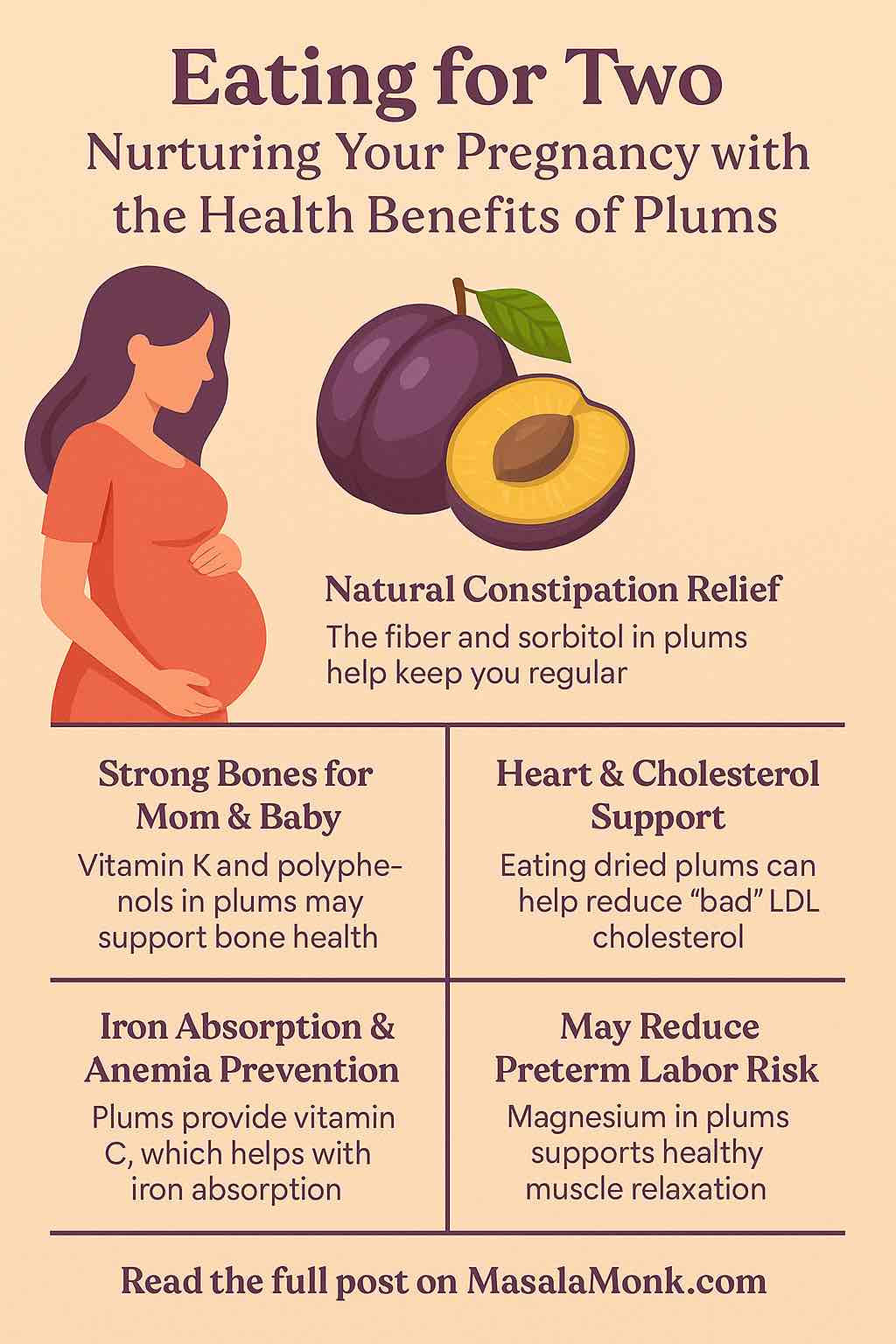
Pregnancy cravings can be funny — one day it’s mangoes, the next it’s a steaming plate of shrimp stir-fry. But when seafood is on your mind, it’s natural to wonder: Is shrimp safe for me and my baby?
The short answer: Yes, it’s one of the best seafood choices you can make while pregnant — low in mercury, high in lean protein, and brimming with nutrients that support your baby’s growth. The key is knowing how much to eat, how to prepare it safely, and how it fits into a balanced pregnancy diet.
Let’s break it down so you can enjoy shrimp with confidence.
Why Shrimp Deserves a Place on Your Pregnancy Plate
A 3-ounce serving of shrimp offers:
- ~20g of lean protein to support tissue growth for you and your baby
- Iodine, essential for thyroid health and brain development
- Vitamin B12, for healthy nerve function and red blood cell production
- Selenium and zinc, to strengthen your immune system
- Choline, for cognitive development
- A dash of omega-3 fatty acids (DHA & EPA) — not as much as salmon, but still valuable
It’s also naturally low in fat and calories, making it an easy way to add protein without feeling heavy.
If you love learning about other low-mercury shellfish, you might also enjoy our guide to Scallops and Pregnancy.
Also Read: What is Protein?
The Science-Backed Benefits of Eating Shrimp During Pregnancy
Recent research has given us more reason to enjoy shrimp:
- Supports baby’s growth: A 2023 study found that eating at least 75 g of seafood per week (including shrimp) lowered the risk of low birth weight and improved infant growth.
- Boosts brain development: A 2025 review linked seafood consumption in pregnancy to better cognitive outcomes in children, thanks to nutrients like DHA and iodine.
- Reduces certain pregnancy risks: Moderate seafood intake is tied to a lower chance of preterm birth and better maternal heart health.
And because shrimp is on the FDA’s “Best Choices” list for seafood, it’s considered one of the safest options in pregnancy.
For more on choosing wisely from the seafood aisle, check out our Guide to Seafood and Pregnancy.
How Much Shrimp is Safe During Pregnancy?
Most experts recommend 8–12 ounces of low-mercury seafood per week. That works out to about:
- 2–3 servings of cooked shrimp
- You can mix it up with other safe choices like scallops, salmon, or sardines
If you’re wondering about other shellfish options, our Shellfish and Pregnancy article covers the safest picks and how to prepare them.
Safety Tips: Cooking Shrimp the Right Way
Pregnancy changes your immune system, making you more vulnerable to foodborne illness. So shrimp should always be fully cooked:
- Look for a pearly, opaque color and firm texture
- Internal temperature should reach 145°F (63°C)
- Avoid sushi, ceviche, or cold shrimp that hasn’t been reheated until piping hot
If you need cooking inspiration, our Omega-3 Rich Seafood Recipes for Pregnancy includes a flavorful shrimp stir-fry that’s quick, safe, and pregnancy-friendly.
Making the Most of Shrimp in Your Diet
Here are a few practical, tasty ways to enjoy shrimp:
- Shrimp & vegetable stir-fry with ginger and garlic
- Shrimp quinoa bowl with lemon and olive oil for extra iron absorption
- Shrimp salad wraps with avocado for healthy fats
- Shrimp curry with coconut milk for richness and added minerals
For a plant-based omega-3 boost alongside your seafood, explore our 10 Exotic Superfoods for a Healthy Pregnancy.
Final Thoughts
Shrimp is one of the easiest, safest, and most nutrient-packed seafood choices you can enjoy during pregnancy. It delivers lean protein, key minerals, and brain-boosting nutrients — all while being low in mercury.
By keeping it fully cooked, sticking to the recommended servings, and pairing it with other wholesome foods, you can savor shrimp without worry.
Pregnancy is all about nourishing both yourself and your baby, and sometimes, that means saying yes to the foods you love — as long as they’re prepared safely and thoughtfully.
FAQs: Shrimp and Pregnancy
1. Is it safe to eat shrimp while pregnant?
Yes, shrimp is considered one of the safest seafood options in pregnancy because it’s low in mercury. Just be sure it’s fully cooked before eating.
2. How much shrimp can I eat during pregnancy?
Most health authorities recommend 8–12 ounces of low-mercury seafood per week. This can include 2–3 servings of cooked shrimp.
3. Why is shrimp a good choice in pregnancy?
It’s rich in protein, iodine, vitamin B12, selenium, choline, and omega-3s — all of which support your baby’s growth, brain development, and your overall health.
4. Does shrimp contain omega-3 fatty acids?
Yes, shrimp contains smaller amounts of DHA and EPA compared to fatty fish like salmon, but it still contributes to your omega-3 intake.
5. Can eating shrimp help my baby’s brain development?
Yes. Nutrients in shrimp — especially iodine, choline, and omega-3s — support healthy brain and nervous system development.
6. Are there any risks to eating shrimp in pregnancy?
The main risks come from eating raw or undercooked shrimp, which may carry harmful bacteria or parasites. Always cook shrimp to 145°F until opaque and firm.
7. Can I eat shrimp in the first trimester?
Yes, as long as it’s fully cooked. Shrimp is safe and beneficial throughout all trimesters of pregnancy.
8. What’s the healthiest way to cook shrimp while pregnant?
Steaming, grilling, or sautéing with minimal oil are great options. Avoid deep-frying or overly processed shrimp dishes.
9. Can I eat cold shrimp in pregnancy?
Only if it has been previously cooked and then reheated until steaming hot. Avoid pre-cooked shrimp served cold, like in buffet settings.
10. What can I pair with shrimp for a more balanced meal?
Combine shrimp with vegetables, whole grains like quinoa or brown rice, and healthy fats like avocado or olive oil for a nutrient-dense plate.












